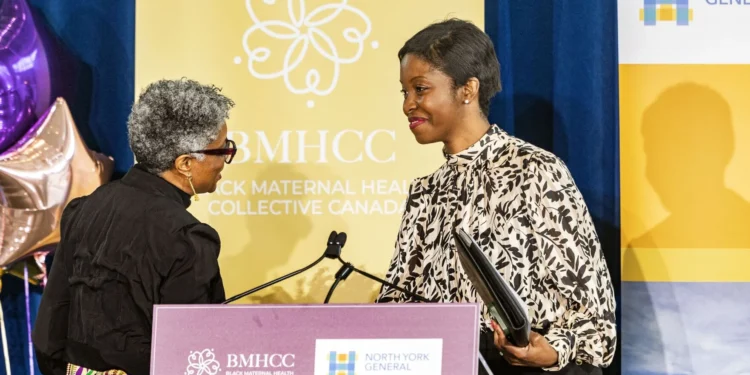April 15, 2025 Story by: Publisher
As a leader in primary health care, Lori-Ann Green-Walker is well aware of the barriers expectant Black patients face to access care — and how those barriers can shape their maternal health outcomes.
They may be newcomers to Canada, “underemployed or unemployed, there may be a lack of transportation, or they may be food insecure. All of these have to be navigated prior to reaching the health centre,” said Green-Walker, executive director of Women’s Health in Women’s Hands Community Health Centre, which provides “culturally safe, relevant” care for racialized women, trans and non-binary people in the GTA.
“Oftentimes, by the time they reach our centre, their health tends to be in a state where it’s at crisis.”
On top of these systemic challenges, she said Black patients often describe feeling unheard, being denied pain medication during labour or dismissed as angry when they’ve tried to raise concerns.
Green-Walker and other experts say these types of experiences contribute to more negative health outcomes for pregnant Black patients compared to their white peers. While there is minimal Canadian race-based data available on maternal health, experts warn of a “silent epidemic” contributing to these disparities.
A group of advocates, medical professionals and organizations is working to raise awareness of the issue and drive change with the city’s declaration of April 11 — 17, 2025 as the first Toronto Black Maternal Health Week. A similar effort is in the works provincially, with Bill 209 — which would designate April as Black Maternal Health and Reproductive Justice Month — awaiting second reading at Queen’s Park.
Toronto’s inaugural Black Maternal Health Week was launched by North York General Hospital and the Black Maternal Health Collective Canada last Thursday. The week includes events for health-care practitioners and midwives, a birth justice workshop and a day dedicated to research and policy.
Improving Black maternal health outcomes requires a multi-pronged approach, said Dr. Modupe Tunde-Byass, president-elect of the Federation of Medical Women of Canada and North York General Hospital obstetrician and gynecologist. Raising awareness is a significant first step.
“It’s important for everyone — especially health-care providers — to be aware that there are disparities, understand that there is unequal treatment, anti-Black racism and systemic discrimination within our system,” said Tunde-Byass. Addressing unconscious biases is also necessary. “Competency may be difficult to achieve, but cultural humility is important,” she added.
“It’s important for everyone — especially health-care providers — to be aware that there are disparities, understand that there is unequal treatment, anti-Black racism and systemic discrimination within our system,” said Tunde-Byass. Addressing unconscious biases is also necessary. “Competency may be difficult to achieve, but cultural humility is important,” she added.
Emphasizing the urgency of the issue, Julie Sobowale, executive director of Black Physicians of Canada, said “there’s a silent epidemic going on in terms of Black women and their journey through pregnancy and childbirth.”
Of the limited race-based medical data available in Canada, a 2016 study out of McGill University found that between 2004 and 2006, 8.9 per cent of infants born to Black mothers were pre-term — which can lead to development problems, negative health outcomes later in life and is the leading cause of perinatal mortality. That compare to 5.9 per cent of infants born pre-term to white mothers. The findings were similar in magnitude to disparities observed between Black and white women in the U.S. who birthed pre-term babies during the same period.
The study found socioeconomic conditions were important predictors of pre-term birth. “Although the income gap between Black and white people is markedly smaller in Canada than in the U.S., Black populations in both countries have lower education levels, higher unemployment rates and a greater likelihood of living in low-quality neighbourhoods compared with white populations,” it said.
An Ontario-based study from 2022 found that Black pregnant patients are at increased risk for having stillbirths, gestational diabetes, pre-eclampsia, emergency Caesarean sections and placental abruptions when compared to white pregnant patients.
“We all know somebody who has gone through this experience,” said Sobowale. “There are higher mortality rates for Black women and their babies.”
In addition to raising awareness, Toronto Black Maternal Health Week aims to have more data gathered, which can then be used to drive evidence-based policy decisions to address these disparities.
“If we haven’t studied something robustly, then it’s really difficult to say” what’s causing it, said Sobowale. “When I talk about social and cultural stigma, the feeling of being invisible, unheard, ignored — part of that, of course, is anti-Black racism in our culture. But that’s not going to explain everything,” she said. “While we know that exists, we still need to have an evidence-based approach.”
Source: Toronto Star

















